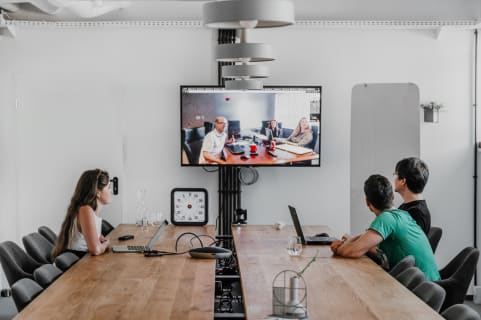Turning Failures into Success: The Boldare and TeamAlert Experience
Nobody enjoys making mistakes. They’re uncomfortable to confront, especially when they affect others. However, failures are a part of our lives, and at Boldare, we believe they are a natural part of the learning process. That’s why we choose to celebrate them rather than cover them up. If we can learn a valuable lesson, let’s share it. After all, it makes us a bit wiser. This time, we’re celebrating our mistake with one of our partners, Allan Wilson, CEO and founder of an emergency app TeamAlert, and Olena Brenych, Delivery Lead at Boldare. Continue reading to learn about the mistakes we’ve made and how they paved the way to success and long-term collaboration.

Table of contents
TeamAlert is a workplace panic button system used in 7 countries, primarily in the United States. Our main customers include municipalities, mental health organizations, educational institutions, and religious organizations. When employees find themselves alone in threatening situations, TeamAlert provides a one-button method to alert multiple resources that they need help, giving them confidence in their protection. We have been partnering with TeamAlert since 2019. Our collaboration with this US-based client serves as the perfect example of a well-learned lesson that ultimately strengthened trust between us and built a lasting relationship.
Iza: Olena, could you briefly describe the Delivery Lead role and its responsibilities?
Olena: I’m accountable for my clients’ success management, leading teams towards goals from strategy to delivery. I’m responsible for the product part of cooperation, ensuring service delivery on time and achieving client’s business goals, as well as coordinating work and people on the Boldare side.
Iza: And what have we done for TeamAlert so far?
Olena: We have a pretty long story. It started with an audit and strategic workshops to set goals. After the development and maintenance phases, Allan came up with new ideas and features, so we returned to development to enhance the product.
Iza: Olena, what would you consider our biggest mistake in our cooperation?
Olena: The biggest mistake and challenge for us was the wrong estimations of work to be done. Allan came with some needs that we had to implement. We gave him estimations of the time and budget. But then, when we got to the development stage, we found out we were exceeding the budget and timeline. At the same time, we weren’t delivering the value we promised.
This was the moment when we had to stop and reflect on what we did wrong and how we can become a reliable partner for the client, so he could count on us and our expertise.
So, we were looking for all sorts of solutions.
Iza: Crossing the budget doesn’t sound good. Would it not have been easier to simply give up?
Olena: Probably, yes! Maybe for some companies, but not Boldare. It wasn’t even an option for us. We were looking for solutions. We knew that if we made mistakes, we are responsible for fixing them. We decided to invest more, add people until we were able to reach the goal. This is our approach.
We don’t want to just do things and send the invoice. First of all, we want to achieve the goals of our clients.
Iza: Allan, did you feel taken care of and assured we wouldn’t give up?
Allan: From our perspective, it is normal to occasionally run into problems when working with vendors. You find out the type of company you are working with on how they handle those problems. Boldare has always done a great job of clear, honest communication to come to an acceptable outcome. They take ownership of a problem instead of trying to maneuver around the issue. They do a great job of allowing us to feel heard and comfortable with where we are going to go to fix the problem.
Iza: Olena, what did we do as a team to deliver the promised scope?
Olena: We made very good use of our framework, Boldare’s Service Standards. We implemented a lot of artifacts and new roles. One of them was my role, Delivery Lead, which has a very specific field of ownership. We also implemented the role of the Tech Lead, which took ownership of the technical side of the project.
Apart from that, we’ve introduced some smaller tools, such as a delivery plan, which helped us keep track, analyze clients’ needs through service design, and base our actions on them. We also introduced a simple meeting matrix, which shows which meetings you should actually have with the team or the client, stick to the iterations, and conduct quality check-ins. These may seem unnecessary, but they were really significant when we started to stick to them.
Iza: Olena, what did we learn from this situation as a company?
Olena: Even with an immense 20 years of experience and many highly specialized experts on board, we still have to start every project from the beginning, not making assumptions or thinking we already know everything. We need to adopt new practices and acquire new knowledge because the world is changing very fast.
This experience also highlighted the importance of human relationships, being transparent, and honestly admitting to mistakes, and expressing the willingness to fix them. After that, I believe our bond became even stronger. Allan knew he could count on us. We wouldn’t pretend; instead, we openly communicated what was going on.
Iza: Allan, tell us about your product today and future plans.
Allan: I am happy to say that the new features are rolled out and the system is stable with happy customers. Currently, we are beginning to focus on making these new features easier to use and gathering feedback on them for future improvements. I would say right now our main future goals are moving towards being more focused on improving the customer interface versus adding new featuresn
Iza: Thank you for the conversation, and I look forward to further developing our cooperation.
Share this article:







